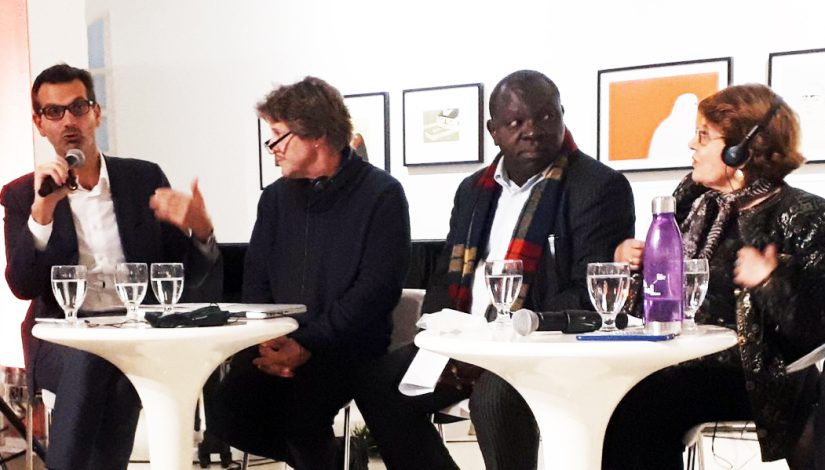The International Federation of Coalitions for Cultural Diversity (IFCCD) met in Montreal for its fifth international congress on October 26 and 27, 2018.
Founded on 19 September 2007 in Seville, Spain, the IFCCD is the voice of cultural professionals around the world. Its member coalitions represent creators, artists, independent producers, distributors, broadcasters and publishers in the book, film, television, music, performing arts and visual arts sectors.
Since its foundation in Seville, the Federation has held its international congress in Salvador de Bahia (Brazil) in 2009, Bratislava (Slovakia) in 2012, Mons (Belgium) in 2015. This year, Canada hosted the event, which brought together eighteen delegates on site and four remotely. Nineteen countries were represented: Cameroon, Gabon, Mali, Niger, Uganda, Senegal, Chad, Togo (Africa), Argentina, Canada, Chile, Mexico, Paraguay (Americas), Australia (Asia-Pacific), Belgium, France, Slovakia, Switzerland (Europe), Uganda and United Kingdom.
What to remember from the Montreal Congress
The IFCCD had experienced a slowdown in its activity since the Mons Congress in 2015, its secretariat having been vacant for almost two years. Organized to relaunch the IFCCD’s work, the Montreal Congress provided many avenues for reflection and work for the coming years.
During the first day, IFCCD members discussed the composition of the organization, its means of action, the possibilities of supporting national coalitions and their necessary re-mobilization at the regional level around targeted actions. They also expressed their wish to rebuild the relationship with the UNESCO Secretariat and to get involved in the activities surrounding the Convention on the Protection and Promotion of the Diversity of Cultural Expressions.
During a round table discussion, everyone presented the challenges of cultural diversity in their country, developments since the ratification of the UNESCO Convention, progress, obstacles and the current situation of each coalition.
South America, which was particularly mobilized at the time of the adoption of the Convention, has experienced political changes that have marked the cultural sector and weakened the coalitions that have been in place in recent years. The lack of resources complicates coordination between civil society organizations in the field of culture. Nevertheless, IFCCD members are taking every opportunity to participate in legislative reviews or to establish, as in Chile, a national day for cultural diversity.
In Africa, the situation is also very much linked to the political context of each country. For many, the challenge is to depoliticize culture. There is a lack of resources in the region but also a problem with the management of funds, which are not always allocated properly. The discussions also revealed that the Convention is largely unknown in most countries and that governments must be made aware of the importance of cultural exemption clauses in trade treaties.
The situation in Asia-Pacific, which was poorly represented at this congress, made it possible to present the problems related to authoritarian regimes and the issues of freedom of expression that affect many artists. The territorial and linguistic challenge makes joint action difficult, but several organizations maintain a certain dynamism and activity in their countries.
In Europe, the focus is on strengthening national coalitions for better networking. As in Canada, the development of digital technology and its impact on culture are at the heart of general concerns. Coalitions are also mobilizing to recognize the specificity of cultural goods and services in trade agreements.
A dialogue with representatives of the governments of Quebec and Canada
The congress continued in the presence of representatives of the Canadian and Quebec governments, who came to meet the members of the IFCCD.
The Government of Quebec has identified three main priorities regarding the diversity of cultural expressions: the implementation of the UNESCO Convention in the digital context, the challenges of international trade, and international cooperation, in particular through UNESCO’s International Fund for Cultural Diversity (IFCD).
The presence of Canadian government officials opened a discussion on maintaining the cultural exemption in the new U.S.-Mexico-Canada free trade agreement. The France-Canada declaration on cultural diversity and the digital space was also mentioned.
The exchange highlighted that government support for the CDCE and the work of the IFCCD is valuable and extremely beneficial for all organizations around the world, and should be an example to be followed in other countries.
Finally, this exchange was also an opportunity to discuss the mobility of artists and the means to be implemented to improve their circulation.
Working with the research community
Researchers were invited to join delegates to provide input on the second day of the conference. Véronique Guèvremont, of the UNESCO Chair on the Diversity of Cultural Expressions, presented the Study on International Cooperation with French-speaking African Countries for the Implementation of the Convention on the Diversity of Cultural Expressions in the Digital Environment, commissioned by the Ministry of Culture and Communications of Quebec and conducted in five African countries: Benin, Burkina Faso, Côte d’Ivoire, Mali and Senegal.
Destiny Tchéhouali, a researcher at the Centre d’études sur l’intégration et la mondialisation (CEIM – Université du Québec à Montréal) then discussed his work with the Organisation Internationale de la Francophonie, in relation to international Internet governance and the diversity of cultural expressions in the digital age.
The discussion continued on the importance of collaboration with researchers, in particular on information sharing (statistical data, national reports) and the bridges to be built between the IFCCD and the various UNESCO Chairs, the academic community and networks such as the International Network of Jurists for the Diversity of Cultural Expressions.
The IFCCD members then summarized their priorities and defined several working areas and projects for the year 2018-2019.
The Congress ended with the election of the Board of Directors, which maintained the current bodies to better prepare for the future. The next IFCCD Congress will be held in an African country in the fall of 2019.
